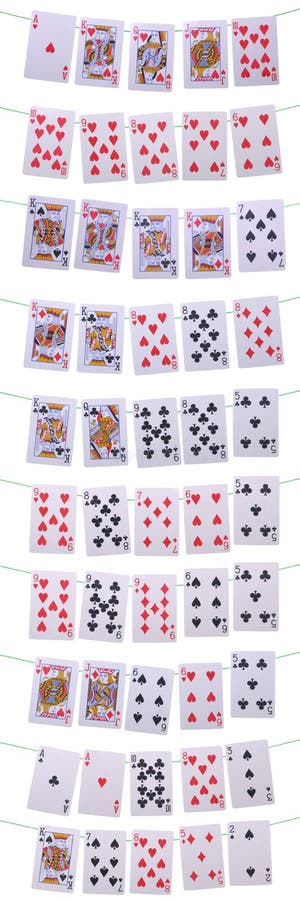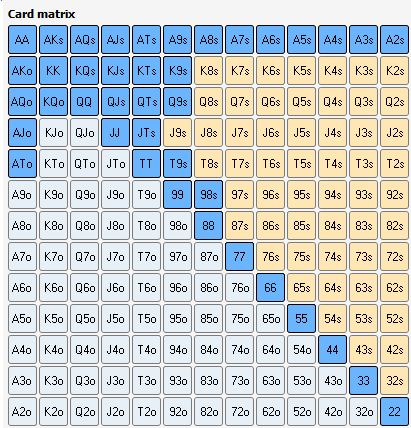Poker Basic Hands
| Example drawing to | Outs | Make on turn | Make on river | Make on turn or river | |||
|---|---|---|---|---|---|---|---|
| Prob. | Odds | Prob. | Odds | Prob. | Odds | ||
| Inside straight flush; Four of a kind | 1 | 0.0213 | 46.0-1 | 0.0217 | 45.0-1 | 0.0426 | 22.5-1 |
| Open-ended straight flush; Three of a kind | 2 | 0.0426 | 22.5-1 | 0.0435 | 22.0-1 | 0.0842 | 10.9-1 |
| High pair | 3 | 0.0638 | 14.7-1 | 0.0652 | 14.3-1 | 0.1249 | 7.01-1 |
| Inside straight; Full house | 4 | 0.0851 | 10.8-1 | 0.0870 | 10.5-1 | 0.1647 | 5.07-1 |
| Three of a kind or two pair | 5 | 0.1064 | 8.40-1 | 0.1087 | 8.20-1 | 0.2035 | 3.91-1 |
| Either pair | 6 | 0.1277 | 6.83-1 | 0.1304 | 6.67-1 | 0.2414 | 3.14-1 |
| Full house or four of a kind; (see note) Inside straight or high pair | 7 | 0.1489 | 5.71-1 | 0.1522 | 5.57-1 | 0.2784 | 2.59-1 |
| Open-ended straight | 8 | 0.1702 | 4.88-1 | 0.1739 | 4.75-1 | 0.3145 | 2.18-1 |
| Flush | 9 | 0.1915 | 4.22-1 | 0.1957 | 4.11-1 | 0.3497 | 1.86-1 |
| Inside straight or pair | 10 | 0.2128 | 3.70-1 | 0.2174 | 3.60-1 | 0.3839 | 1.60-1 |
| Open-ended straight or high pair | 11 | 0.2340 | 3.27-1 | 0.2391 | 3.18-1 | 0.4172 | 1.40-1 |
| Inside straight or flush; Flush or high pair | 12 | 0.2553 | 2.92-1 | 0.2609 | 2.83-1 | 0.4496 | 1.22-1 |
| 13 | 0.2766 | 2.62-1 | 0.2826 | 2.54-1 | 0.4810 | 1.08-1 | |
| Open-ended straight or pair | 14 | 0.2979 | 2.36-1 | 0.3043 | 2.29-1 | 0.5116 | 0.955-1 |
| Open-ended straight or flush; Flush or pair; Inside straight, flush or high pair | 15 | 0.3191 | 2.13-1 | 0.3261 | 2.07-1 | 0.5412 | 0.848-1 |
| 16 | 0.3404 | 1.94-1 | 0.3478 | 1.88-1 | 0.5698 | 0.755-1 | |
| 17 | 0.3617 | 1.76-1 | 0.3696 | 1.71-1 | 0.5976 | 0.673-1 | |
| Inside straight or flush or pair; Open-ended straight, flush or high pair | 18 | 0.3830 | 1.61-1 | 0.3913 | 1.56-1 | 0.6244 | 0.601-1 |
| 19 | 0.4043 | 1.47-1 | 0.4130 | 1.42-1 | 0.6503 | 0.538-1 | |
| 20 | 0.4255 | 1.35-1 | 0.4348 | 1.30-1 | 0.6753 | 0.481-1 | |
| Open-ended straight, flush or pair | 21 | 0.4468 | 1.24-1 | 0.4565 | 1.19-1 | 0.6994 | 0.430-1 |
Poker Hands Order
Check-raise is permitted in all games, except in certain forms of lowball.
What Are The Best Starting Poker Hands


This is meant as a very basic primer into the rules of poker, for more information, get a book on the game (or start playing with a group of people who know how. It's more expensive than reading a book, but the group won't mind. This list is currently broken into several parts: The Very Basics How the Hands are Ranked. Common Traits of Most Poker Rules The Value of Poker Hands One element used in most poker variants is the system of hand rankings. The highest ranked hand is a Royal Flush (five cards of the same.
In no-limit and pot-limit games, unlimited raising is allowed.
Unlimited raising is allowed in heads-up play. This applies any time the action becomes heads-up before the raising has been capped. Once the raising is capped on a betting round, it cannot be uncapped by a subsequent fold that leaves two players heads-up.
Any wager must be at least the size of the previous bet or raise in that round, unless a player is going all-in.
If someone is 'all in', how much of the pot can they win? A person who is all in can win the amount of the pot that they have invested. Any additional bet starts a new 'side pot' and can only be won by players contributing to that pot.
The smallest chip that may be wagered in a game is the smallest chip used in the antes, blinds, rake, or collection.

A verbal statement denotes your action and is binding.
Rapping the table with your hand is considered a pass.
Deliberately acting out of turn will not be tolerated. A player who checks out of turn may not bet or raise on the next turn.
To retain the right to act, a player must stop the action by calling 'time'. Failure to do so may cause you to lose the right to act. You can’t forfeit your right to act if any player in front of you has not acted, only if you fail to act when it legally becomes your turn. A player who bets or calls by releasing chips into the pot is bound by that action.
In limit poker, if you make a forward motion with chips and thus cause another player to act, you may be forced to complete your action.
To protect your right to raise, you should either declare your intention verbally or place the proper amount of chips into the pot.
If you put a single chip in the pot that is larger than the bet, but do not announce a raise, you are assumed to have only called so make sure you know what you are putting in the pot.
All wagers and calls of an improperly low amount must be brought up to proper size if the error is discovered before the betting round has been completed. In poker you must be alert and fully aware of what you are doing at all times.